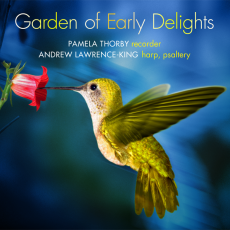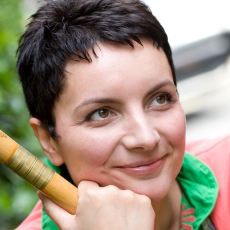Garden of Early Delights - Pamela Thorby & Andrew Lawrence-King - International Record Review
From its punning title onwards, this disc is a most engaging production at every level. It certainly looks extremely attractive, packaged as it is one of those new, solid jewel-cases with rounded corners, reserved so far by the music industry for SACDs, and with a gorgeous cover illustration of an exotic emerald-coloured humming bird at a flower before a rich blue background. On listening, the clarity and immediacy of the high-definition SACD sound engineering is arresting. Andrew Lawrence-King's two instruments, a Spanish double harp after Zurberán used solely for the opening piece, Diego Ortiz's Recercada segunda de tenore based on the passamezzo moderno ground, and an Italian-style Baroque triple harp, benefit the most strikingly from this feature. This is especially the case in his deeply satisfying transcriptions of John Dowland's Sorrow, stay and Biagio Marini's Passacalio, originally written for violin. The disc's natural, unforced sound quality also benefits Pamela Thorby's soprano, alto and tenor recorders, the tone of each of which lacks the hard edge that can easily mar even superior CD recordings of these instruments.
At first glance, the duo's programme might seem like a casually thrown together salad of works of disparate styles. In fact, as Thorby puts it, it is a mixed bouquet from the ‘Garden of Early Delights', and a very captivating collection it is too. Variation and ornamentation are prominent themes, given the inclusion of sets of diminutions from Ortiz's Treatise of Glosses (1553), the two heavily ornamented settings by Giovanni Bassano of the famous sixteenth-century French chansons, Frais et galliard and Susanne ung jour, and a few later, more Baroque-style recorder variations by Jacob Van Eyck. The group of early seventeenth-century sonatas by Castello and Fontana introduce the Baroque idea of ornamentation for expressive ends instead of virtuosity for its own sake. They apply Bassano's beloved passaggi in novel ways, combining them with many other tricks derived from vocal music, such as trills, flourishes and the swelling messa di voce.
Although their playing is exuberant, only rarely do Thorby and Lawrence-King stray beyond the bounds of good taste. Thorby's rather jazzy, dissonant passages, occasional deliberately distorted notes and abrupt octave leaps in Ortiz's Recercada segunda and in Van Eyck's variations on the naïve Dutch song Wat zal men op den Avond doen are rare instances of her enthusiasm overcoming good judgement. That aside, her execution is flawless, retaining a light, cleanly articulated nimbleness even in the most blindingly fast passages of the latter work. Only Johann Schop's variations on Dowland's Lachrimae Pavan, written originally for violin and harpsichord or lute, do not sound completely apt in their transposition for alto recorder and harp. Despite Thorby's fine control of her instrument's timbres and astonishing breath control, and despite the genuinely enjoyable performance, this work really needs the more strongly textured sound of a string instrument.
The production is completed by Lawrence-King's informative notes, which explain with admirable clarity the elements of the different styles of music gathered together on this disc - as well as manfully attempting to correct the harp's modern image as being essentially a women's instrument.
The garden of later Renaissance and early Baroque instrumental music is Edenic in its richness. Thorby's and Lawrence-King's ‘bouquet' is a small but enticing sample of its many delights.

